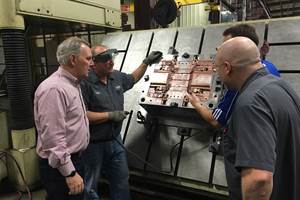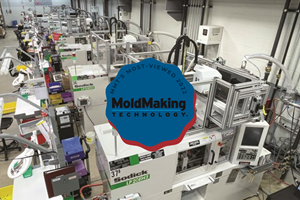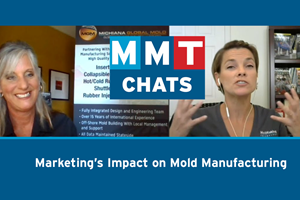Moldmaking, Molds and Tariffs
Gardner Business Intelligence addresses interest and concerns with the ongoing tariff changes.
MoldMaking Technology along with MMT’s sister-brands have received significant interest in understanding how recent tariffs will affect the moldmaking industry. The issue is an important but complicated one as tariffs can result in retaliatory tariffs, furthermore, tariffs can also be levied on one or several specific countries. Much attention is often paid only to tariffs in terms of the total amount of trade that they are likely to impact in one direction or from only one country. The reality of the situation is that many countries are simultaneously changing their trade stances with other nations. The U.S. has been adjusting its trade position not only with China during 2018, but with its two largest trading partners Canada and Mexico. The new U.S.-Mexico-Canada Agreement or “USMCA” was signed in late November and now awaits each country’s ratification by their respective legislatures. In addition, Britain’s exit from the European Union, frequently referred to as “Brexit” is due to occur in late March of 2019.
Brexit, unlike the other trading nations previously addressed, will have a unique impact on European trade as London is one of the world’s largest financial hubs with significant involvement in many international financial deals. Many economic white papers have taken efforts to explain the impact of Brexit on foreign direct investment and the ability of firms to borrow capital. The complete Brexit process is also taking place on a much longer timeline than that of America’s changing trade rules with critical trading nations. The UK’s new trade rules post-Brexit are not expected to take effect until January 2021. Firms who buy from, or sell to, European firms may need to be more aware of the financial conditions of firms that are highly reliant on foreign direct investments “FDI”. FDI plays a particularly important role in the technological development and the ability of firms to capitalize on technological innovation. Several economists have written extensively on the link between stable well-regulated economies and the ability of firms in these areas to receive investment funding[1].
Through 2018 there have been several tariffs put into place that have affected the price and trade volumes of aluminum, steel and a significant portion of other moldmaking and mold-related goods. Initial tariffs put on steel and aluminum under Section 232 (allowing tariffs on goods due to concerns over national security) took effect on June 1st, 2018. Since then a host of other tariffs under Section 301 (allowing the U.S. to take whatever appropriate trade actions it deems necessary towards countries with unreasonable or discriminatory trade practices) have come into effect. As of late 2018, the latest and most significant list of such Section 301 tariffs took effect in late September, affecting $200 billion of imports across more than 5,700 types of products, known as “tariff lines”.
Breaking it Down
Of the thousands of affected products, Gardner identified at least twenty-one tariff lines which are of critical or substantial importance to the moldmaking and molding industry. These lines, addressed by their dollar impact- generally can be grouped into injection or compression molds for rubber or plastics, aluminum and lastly molds for rubber or plastics other than injection molding. The majority of these tariff lines took effect in June and July of 2018, thus the Gardner Business Index data for the fourth quarter of 2018 and afterwards may provide some initial ideas as to the effect that the early impacts of tariffs have had on the industry. In December of 2018, the U.S. determined to delay further tariff rate increases on Chinese goods for an additional 90-days. This gives both countries until March 2nd, 2019 to reach a trade agreement before higher rates take effect.
Among mold-related manufacturers serving specific end-markets, Gardner’s business index respondents have reported faster new orders growth during the later-half of 2018 in automotive, forming and fabricating and custom processing.
Related Content
OEE Monitoring System Addresses Root Cause of Machine Downtime
Unique sensor and patent-pending algorithm of the Amper machine analytics system measures current draw to quickly and inexpensively inform manufacturers which machines are down and why.
Read MoreMaking Quick and Easy Kaizen Work for Your Shop
Within each person is unlimited creative potential to improve shop operations.
Read MoreMold Builder Uses Counter-Intuitive Approach for Mold Challenges
Matrix Tool Inc. answers customers’ hard questions with creative solutions for cavity spacing, tool sizing, runner layout and melt delivery that reveal the benefits of running in a smaller press size at lower cavitation but higher yield.
Read MoreMMT Chats: Marketing’s Impact on Mold Manufacturing
Kelly Kasner, Director of Sales and Marketing for Michiana Global Mold (MGM) talks about the benefits her marketing and advertising, MGM’s China partnership and the next-generation skills gap. This episode is brought to you by ISCAR with New Ideas for Machining Intelligently.
Read MoreRead Next
Reasons to Use Fiber Lasers for Mold Cleaning
Fiber lasers offer a simplicity, speed, control and portability, minimizing mold cleaning risks.
Read MoreHow to Use Strategic Planning Tools, Data to Manage the Human Side of Business
Q&A with Marion Wells, MMT EAB member and founder of Human Asset Management.
Read MoreHow to Use Continuing Education to Remain Competitive in Moldmaking
Continued training helps moldmakers make tooling decisions and properly use the latest cutting tool to efficiently machine high-quality molds.
Read More
.jpg;width=70;height=70;mode=crop)














.jpg;maxWidth=300;quality=90)

.png;maxWidth=300;quality=90)








